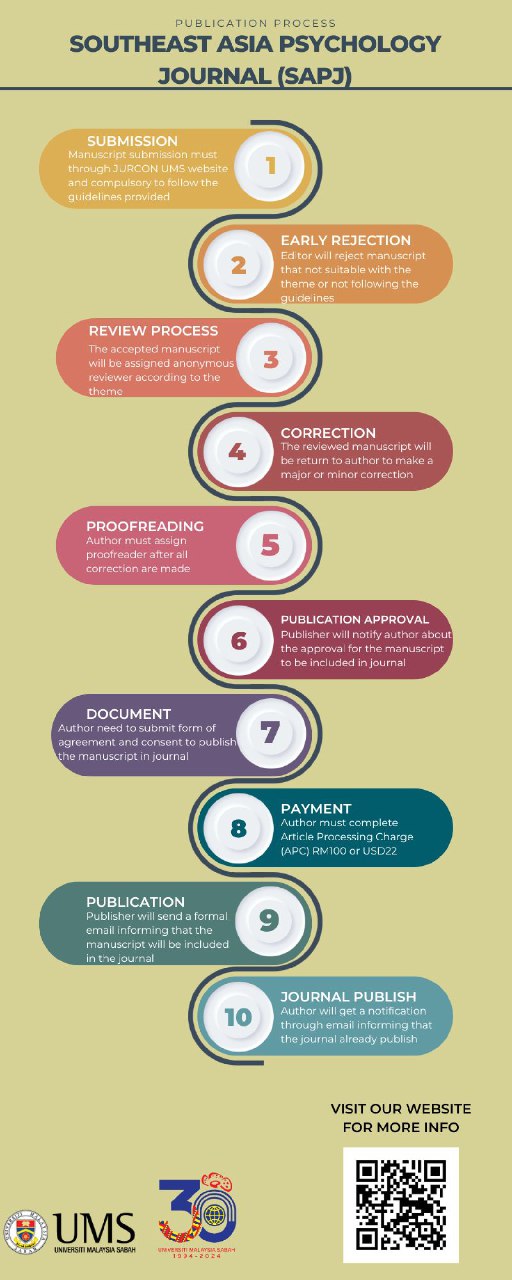KEFUNGSIAN KELUARGA DAN KESEJAHTERAAN PSIKOLOGI DALAM KALANGAN REMAJA LUAR BANDAR DI JERANTUT, PAHANG
DOI:
https://doi.org/10.51200/sapj.v12i2.5016Keywords:
kefungsian keluarga, kesejahteraan psikologi, remaja 10-12 tahun, luar bandar, MalaysiaAbstract
Kajian ini dilaksanakan bertujuan untuk memperbanyak kajian sedia ada berkenaan kefungsian keluarga dan kesejahteraan psikologi remaja luar bandar di Malaysia. Sejumlah 400 orang remaja dari Zon Pulau Tawar, Jerantut, Pahang telah terlibat sebagai responden. Para responden telah melengkapkan satu set soal selidik atas talian merangkumi Skala Kefungsian Keluarga Malaysia (SKK-M) dan Skala Kesejahteraan Psikologi untuk Kanak-Kanak (PWB-c). Majoriti responden adalah remaja berusia 12 tahun (n = 143, 35.80%), perempuan (n = 213; 53.30%), berbangsa Melayu (n = 397, 99.30%), berlatarbelakangkan keluarga normal (n = 353, 88.30%), mempunyai ibu bapa lulusan sekolah menengah (Ibu: n = 261, 65.30%; Bapa: n = 266, 66.50%) serta berasal daripada keluarga B40 iaitu keluarga yang mempunyai pendapatan isi rumah sebulan kurang RM3 900 (n = 324, 81.00%). Dapatan deskriptif mendedahkan nilai min keseluruhan bagi kefungsian keluarga dalam kalangan responden adalah M = 131.48 (SD = 12.383) manakala M = 64.14 (SD = 8.723) bagi kesejahteraan psikologi. Analisis ujian-t sampel bebas melaporkan tahap kefungsian keluarga; t (395.199) = 1.801, k>.05 dan kesejahteraan psikologi; t (396.548) = .285, k>.05 dalam kalangan responden lelaki dan perempuan adalah tidak berbeza secara signifikan. Analisis Ujian Korelasi Pearson pula melaporkan terdapat hubungan positif yang sederhana tetapi signifikan antara kefungsian keluarga (M = 131.48, SD = 12.383) dan kesejahteraan psikologi (M = 64.14, SD = 8.723) dalam kalangan responden, r (400) = .457, k<.001. Pengaplikasian SKK-M dan PWB-c sebagai instrumen kajian diharapkan mempunyai implikasi dalam memahami kefungsian keluarga dan kesejahteraan psikologi remaja luar bandar di Malaysia.
References
Arshat, Z., & Japara, R. (2018). Penglibatan ibu bapa, sokongan sosial dan kesejahteraan psikologi remaja. International Journal of Education, Psychology and Counseling, 3(12), 37-45. https://www.researchgate.net/publication/326146625
Azhar, Z. I., Zahir Izuan, A., Shamsul Azhar, S., Tan, M. K. S., & Syed-Sharizman, S. A. R. (2018). Neighbourhood influences and its association with the mental health of adolescents in Kuala Lumpur, Malaysia. Asian Journal of Psychiatry, 38, 35-41. Elsevier. https://doi.org/10.1016/j.ajp.2018.10.018
Butler, C. (2015, Jun). Family functioning and its relationship to adolescent mental health [Degree of Doctor in Clinical Psychology (DClinPsy)’s thesis, Royal Holloway, University of London]. Royal Holloway Research Portal. https://pure.royalholloway.ac.uk/ws/portalfiles/portal/25391474/Carly_Butler_Family_Functioning_and_Adolescent_Mental_Health_9.9.15.pdf
Bulimwengu, A. S., & Cartmel, J. (2022). The tween years: A systematic literature review for services for children aged 10–13 years. Heliyon, 8(1), e08822. https://doi.org/10.1016/j.heliyon.2022.e08822
Creswell, J. W. (2009). Research design: Qualitative, quantitative, and mixed method approaches (3rd ed.). Sage Publications, Inc.
Desa, A., Yusooff, F., Ahmad Zamani, Z., Abdul Kadir, N. B., & Mohamed Sani, M. N. (2015). Kemahiran keibubapaan, kefungsian keluarga dan kesejahteraan psikologi dalam kalangan ibubapa. Jurnal Psikologi Malaysia, 29(2), 32-42. https://spaj.ukm.my/ppppm/jpm/article/download/156/128
Hendricks, G., Savahl, S., Mathews, K., Raats, C., Jaffer, L., Matzdorff, A., Dekel, B., Larke, C., Magodyo, T., van Gesselleen, M., & Pedro, A. (2015). Influences on life aspirations among adolescents in a low-income community in Cape Town, South Africa. Journal of Psychology in Africa, 25(4), 320-326. Taylor & Francis Online. https://doi.org/10.1080/14330237.2015.1078089
Institut Kesihatan Negara. (2020). National Health and Morbidity Survey (NHMS) 2019: Non-communicable diseases, healthcare demand, and health literacy — Key Findings. https://iku.gov.my/images/IKU/Document/REPORT/NHMS2019/Infographic_Booklet_NHMS_2019-English.pdf
Izzo, F., Baiocco, R., & Pistella, J. (2020). Children’s and adolescents’ happiness and family functioning: A systematic literature review. International Journal of Environmental Research and Public Health, 19(24). MDPI. https://doi.org/10.3390/ijerph192416593
Levy, P. S., & Lemeshow, S. (2013). Sampling of populations: Methods and applications (4th ed.). John Wiley & Sons.
Mansor, S. M., Mydin Kutty, F., & Amat, S. (2021). Hubungan antara penghargaan kendiri dengan kesejahteraan psikologi dalam kalangan kanak-kanak di pedalaman Pulau Tioman . Jurnal Dunia Pengurusan, 3(1), 159-169. https://myjms.mohe.gov.my/index.php/jdpg/article/view/12550/6269
Mohamed, N. A., Silva, J. L. D., Samah, A. A., Shafril, H. A. M., & Dahalan, D. (2018). Exploring contributing factors on holistic well-being among Malaysian youth. International Journal of Academic Research in Business and Social Sciences, 8(3), 410–419. Human Resource Management Academic Research Society (HRMARS). http://dx.doi.org/10.6007/IJARBSS/v8-i3/3937
Mulyati, M., & Martiastuti, K. (2019). The relationship between family function and adolescent autonomy in the rural and urban area. Journal of Family Sciences, 3(1), 15-29. https://doi.org/10.29244/jfs.3.1.15-29
Muniandy, Y., Ee, G. T., & Indang, J. (2022). Kefungsian keluarga dan pengherotan kognitif dalam kalangan klien di PUSPEN Papar, Sabah. Jurnal Antidadah Malaysia, 14(2), 47-59. https://jurnal.adk.gov.my/wp-content/uploads/2023/02/Kefungsian-Keluarga-Dan-Pengherotan-Kognitif-Dalam-Kalangan-Klien-Di-PUSPEN-Papar-Sabah.pdf
Nardi, P. M. (2018). Doing survey research: A guide to quantitative methods (4th ed.). Routledge.
Newland, L. A. (2015). Family well-being, parenting, and child well-being: Pathways to healthy adjustment. Clinical Psychologist, 19(1), 3–14. Australian Psychological Society. https://doi.org/10.1111/cp.12059
Nwachukwu, C. E., Akingbade, A. E., & Olufunmilayo, E. O. (2022). Family characteristics and mental health status of secondary school students in a rural community in Southwest Nigeria. International Journal of Mental Health and Addiction, 20, 1325–1335. SpringerLink. https://doi.org/10.1007/s11469-020-00446-2
Omar, N., & Abu Bakar Ah, S. H. (2017). Poor children in Malaysia: Their index of objective well-being. Southeast Asia: A Multidisciplinary Journal, 17, 8-21. https://fass.ubd.edu.bn/SEA/vol17/SEA-v17-Noralina.pdf
Opree, S. J., Buijzen, M., & Van Reijmersdal, E. A. (2018). Development and validation of the psychological well-being scale for children (PWB-c). Societies, 8(1). MDPI (Multidisciplinary Digital Publishing Institute). https://doi.org/10.3390/soc8010018
Othman, W.N.W., Zainudin, Z.N., Yusof, Y.M., & CheAmat, M.A. (2021). Family functioning and psychological well-being among B40 adolescents: A systematic review. Turkish Online Journal of Qualitative Inquiry (TOJQI), 12(4), 747-770. https://www.tojqi.net/index.php/journal/article/view/1251/591
Pertubuhan Kesihatan Sedunia. (2023, Oktober 11). Adolescent health. https://www.who.int/health-topics/adolescent-health#tab=tab_1
Phillips, T. M., Randall, B. A., Peterson, D. J., Wilmoth, J. D., & Pickering, L. E. (2013). Personal problems among rural youth and their relation to psychosocial well-being. The Journal of Extension, 51(3). https://doi.org/10.34068/joe.51.03.27
Puspitawati, H., Sarma, M., Herawati, T., Noor Yuliati, L., & Azizah, Y. (2020). Model of family subjective well-being in rural and sub urban families. Jurnal Ilmu Keluarga dan Konsumen, 13(2), 99-111. ResearchGate. http://dx.doi.org/10.24156/jikk.2020.13.2.99
Ryff, C. D. (1989). Happiness is everything, or is it? Explorations on the meaning of psychological well-being. Journal of Personality and Social Psychology, 57(6), 1069–1081. https://psycnet.apa.org/doi/10.1037/0022-3514.57.6.1069
Salgado, M., González, L., & Yáñez, A. (2021). Parental involvement and life satisfaction in early adolescence. Frontiers in Psychology, 12. https://doi.org/10.3389/fpsyg.2021.628720
Sharp, E. H., Seaman, J., & Tucker, C. J. (2020). Adolescents’ future aspirations and expectations in the context of a shifting rural economy. Journal of Youth and Adolescence, 49, 534–548. SpringerLink. https://doi.org/10.1007/s10964-019-01152-6
Sumari, M., Md Khalid, N., Zulnaidi, H., Ibrahim, N. H., Baharudin, D. F., & Ahmed Tharbe, I. H. (2020). Development of a Malaysian Family Functioning Scale (MFFS). Journal of Family Social Work, 24(1), 22-42. Taylor & Francis Online. https://doi.org/10.1080/10522158.2020.1770145
Wang, D., Hagedorn, A. D., McLaughlin, D. K., & Bray, B. C. (2018). Change and stability of emotional health of rural Pennsylvania youth during high school. The Journal of Rural Health, 34(3), 322-332. WILEY Online Library. https://doi.org/10.1111/jrh.12296
Yamane, T. (1973). Statistics: An introductory analysis (3rd ed.). Harper and Row.
Yang, Y., & Jiang, J. (2023). Influence of family structure on adolescent deviant behavior and depression: The mediation roles of parental monitoring and school connectedness. Public Health, 217, 1-6. Science Direct. https://doi-org.ezproxy.ums.edu.my/10.1016/j.puhe.2023.01.013








